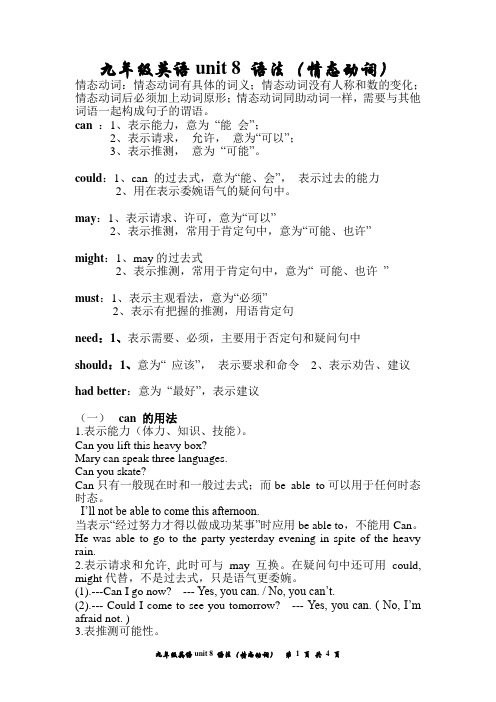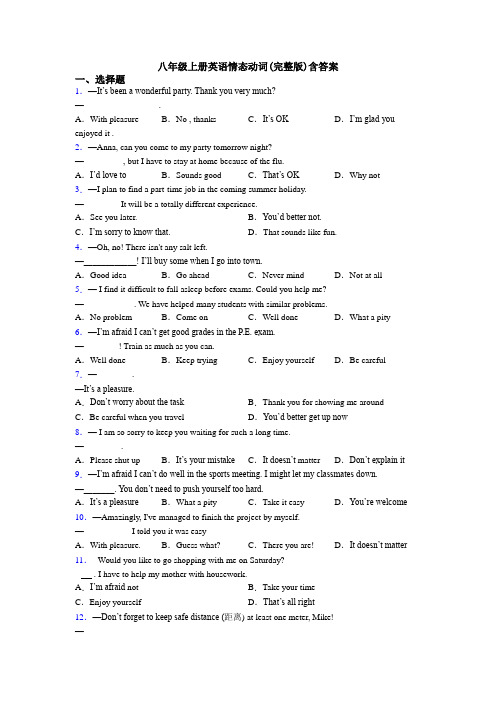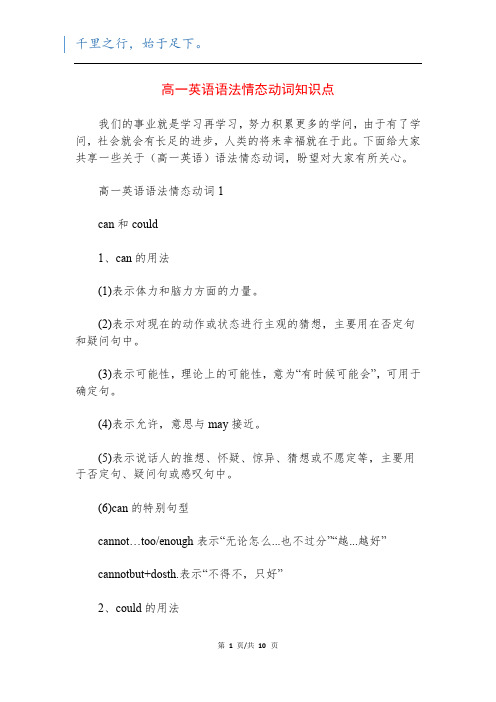(完整版)Einheit8情态动词完成时lassen
情态动词 时态 被动态 冠词 名词所有格 代词 从句

情态动词1. 定义情态动词是一种本身有一定的词义,但必须与动词原形(及其被动语态)一起使用,给(谓语)动词增添情态色彩,表示说话人对有关行为或事物的态度和看法,认为其可能、应该或必要等。
情态动词在句中不受任何人称,性,数变化的影响。
2. 情态动词分类①只做情态动词:must, can(could), may(might), ought to②可做情态动词又可做实义动词:need, dare③可做情态动词又可做助动词:shall(should), will(would)④具有情态动词特征:have(had,has) to, used to, had better3. 情态动词词义解释:must ①必须、必要②表示推测。
一定、肯定。
例句:You must come and renew it. 你必须来续借。
He must be mad. 他一定是疯了。
Can ①能,会。
②表示请求。
请求和允许。
例句:I can do it! 我能做到。
Can I close the window? 我能把窗户关上吗?Could ①can的过去式②也可表示请求,语气委婉例句:We could speak to Felix yesterday. 昨天我们可以和Felix谈话。
Could I use your phone? 让我用一下你的电话好吗?May可以例句:May I have your name? 我可以知道你的名字吗?Might ①may的过去式②表示虚拟语气, 使语气更加委婉, 客气例句:We might go to the park last week. 上周我们可以去公园。
Might I make a suggestion? 我可以提个建议吗?ought to 应该,应当例句:You ought to take care of him. 我们应当多照顾他。
need 需要例句:Need I hand in the homework this week?本周我需要递交作业吗?dare 敢例句:Dare she go to school by herselve? 她敢自己去上学吗?shall应当,应该例句:What shall we do this morning? 今天早上我们应该做什么?should 应该例句:We should do exercise in the morning. 早上我们应该晨练。
九年级英语unit 8 语法(情态动词)A4

九年级英语unit 8 语法(情态动词)情态动词:情态动词有具体的词义;情态动词没有人称和数的变化;情态动词后必须加上动词原形;情态动词同助动词一样,需要与其他词语一起构成句子的谓语。
can:1、表示能力,意为“能会”;2、表示请求,允许,意为“可以”;3、表示推测,意为“可能”。
could:1、can 的过去式,意为“能、会”,表示过去的能力2、用在表示委婉语气的疑问句中。
may:1、表示请求、许可,意为“可以”2、表示推测,常用于肯定句中,意为“可能、也许”might:1、may的过去式2、表示推测,常用于肯定句中,意为“ 可能、也许”must:1、表示主观看法,意为“必须”2、表示有把握的推测,用语肯定句need:1、表示需要、必须,主要用于否定句和疑问句中should:1、意为“ 应该”,表示要求和命令2、表示劝告、建议had better:意为“最好”,表示建议(一)can 的用法1.表示能力(体力、知识、技能)。
Can you lift this heavy box?Mary can speak three languages.Can you skate?Can只有一般现在时和一般过去式;而be able to可以用于任何时态时态。
I’ll not be able to come this afternoon.当表示“经过努力才得以做成功某事”时应用be able to,不能用Can。
He was able to go to the party yesterday evening in spite of the heavy rain.2.表示请求和允许, 此时可与may互换。
在疑问句中还可用could, might代替,不是过去式,只是语气更委婉。
(1).---Can I go now? --- Yes, you can. / No, you can’t.(2).--- Could I come to see you tomorrow? --- Yes, you can. ( No, I’m afraid not. )3.表推测可能性。
德语 lassen 用法

lassen als VollverbLass das! 算了吧!别干了!Du sollst das Rauchen lassen! 别再抽烟了!把烟戒掉吧!Verdammt, ich habe dn Schlüssel im Auto gelassen. 真该死,我把钥匙落在汽车里了。
Wir lassen heute den Wagen in der Garege und machen eine Radtour . 今天我们不开车,骑自行车出去兜风。
Im Kaufhaus haben wir heute mehrere hundert Euro gelassen . 今天我们在百货公司花了好几百欧元。
Wo habe ich nur meinen Pass gelassen? 我把护照放哪儿去了?Lass diese Scherz / den Lärm / das Weinen ! 别开玩笑了/别吵闹了/别再哭了!Lass diesen Blödsinn ! 别犯傻了!Lass endlich die Katze aus dem Sack ! 快讲讲您的真实想法吧!/快讲讲事情的真相吧!Du sollst die Kinder in Ruhe lassen / Lass mich in Ruhe ! 你就随孩子们去吧(别管孩子们)。
/别烦我!Lass alles so , wie es ist! 就让事情这样吧。
Lassen wir alles beim Alten! 让一切都照旧吧!Bei aller Begeisterung , man sollte die Kirche im Dorf lassen . 不管多么高兴都应该一是一,二是二(切莫言过其实)。
Die SPD musste bei der Landtagswahl Federn lassen . 社民党在州议会选举中失去了很多选票。
八年级上册英语情态动词(完整版)含答案

八年级上册英语情态动词(完整版)含答案一、选择题1.—It’s been a wonderful party. Thank you very much?—- ________________.A.With pleasure B.No , thanks C.It’s OK D.I’m glad you enjoyed it .2.—Anna, can you come to my party tomorrow night?—_________, but I have to stay at home because of the flu.A.I’d love to B.Sounds good C.That’s OK D.Why not 3.—I plan to find a part-time job in the coming summer holiday.—________ It will be a totally different experience.A.See you later. B.You’d better not.C.I’m sorry to know that.D.That sounds like fun.4.—Oh, no! There isn't any salt left.—____________! I’ll buy some when I go into town.A.Good idea B.Go ahead C.Never mind D.Not at all 5.— I find it difficult to fall asleep before exams. Could you help me?— ___________. We have helped many students with similar problems.A.No problem B.Come on C.Well done D.What a pity 6.—I’m afraid I can’t get good grades in the P.E. exam.—________! Train as much as you can.A.Well done B.Keep trying C.Enjoy yourself D.Be careful 7.—________.—It’s a pleasure.A.Don’t worry about the task B.Thank you for showing me around C.Be careful when you travel D.You’d better get up now8.— I am so sorry to keep you waiting for such a long time.— ________.A.Please shut up B.It’s your mistake C.It doesn’t matter D.Don’t explain it 9.—I’m afraid I can’t do well in the sports meeting. I might let my classmates down.—_______. You don’t need to push yourself too hard.A.It’s a pleasure B.What a pity C.Take it easy D.You’re welcome 10.—Amazingly, I've managed to finish the project by myself.—___________I told you it was easyA.With pleasure. B.Guess what? C.There you are! D.It doesn’t matter 11.--Would you like to go shopping with me on Saturday?-- . I have to help my mother with housework.A.I’m afraid not B.Take your timeC.Enjoy yourself D.That’s all right12.—Don’t forget to keep safe distance (距离) at least one meter, Mike!—________A.Sorry, I won’t.B.No, I can’t do it.C.Not at all. D.I hope not. 13.—I’m sorry. That wasn’t of much help.— ________. In fact, it was most helpful.A.Thanks anyway B.It doesn’t matter C.Of course not D.Sure it was 14.—I just got a message from Ms. Yang and she said she would come to our meeting this afternoon.— She always has good ideas.A.Why not? B.What a pity! C.Time is up. D.That’ll be very nice. 15.--Would you mind opening the window? It’s too hot.--__________.A.Sorry. I wouldn’t.B.No, of course not.C.It doesn’t matter.D.Yes, please.16.-Do you think the rain will stop tomorrow?-_____. It has rained f or four days. It’s too wet everywhere.A.I hope not B.I don’t think soC.Don’t worry D.I hope so17.— What do you think of the movie Mr. Bea ?—____. It’s very funny.A.I can’t stand it .B.I don’t mind it C.I love it. D.I hate it. 18.—Would you please help me with my spoken English?—__________. First you should know practice makes perfect.A.That’s right B.No problem C.Quite well D.No, thanks 19.—Lucy, can you help me with my history?—________. I am good at it.A.With pleasure B.I’m afraid not C.Sorry, I can’t D.No way 20.—Why not take your son to watch the new film A Little Red Flower?—__________.A.Good idea B.No problem C.Good luck D.No way 21.—I’m sorry I didn’t make it to your birthday party last night.— ________ I know you are busy recently.A.Why not? B.Don’t mention it.C.No way. D.That’s all right. 22.—Excuse me, can you give me some water? The cup is empty.—________A.Go ahead. B.My pleasure C.At your service D.You’d better not. 23.—You seem so happy today, Jack.—________? I won the first prize in the singing competition yesterday.A.So what B.How come C.Guess what D.Why not 24.—________. Where’s the nearest supermarket?—Oh, it’s about 300 meters away, next to a park.A.Thank you B.Excuse me C.Come on D.That’s OK25.–This box is too heavy for me to carry upstairs.–__________A.You may ask for help B.I’ll give you a handC.Please do me a favor D.I’d come to help26.—Many people think women are better at cooking than men.—________. Most top chefs in the world are men.A.I agree B.I ca n’t agree more C.Not at all D.That’s not the case 27.—All of Mark Twain’s novels are popular.— ________. Especially The Adventures of Tom Sawyer.A.I can’t agree more B.That’s not the case C.That’s not the point D.Don’t mention it 28.—Could you help me look after my baby ________ I am away?—________.A.as; With pleasure B.while; My pleasure C.as; That’s all right D.while; With pleasure29.—How do you find the documentary DA VID Profile(国宝档案).—________. I can’t think too highly of it.A.It all depends B.It’s really wonderfulC.No one knows for certain D.It is not my cup of tea30.—I find it really unwise to go travelling during May Day holiday.—________! Wherever you go, it’s crowded with cars and people.A.Not exactly B.Forget it C.You said it D.It depends 31.—Only those who have a lot in common can get along well.—________ Opposites sometimes attract.A.I think so. B.I don’t think so.C.I don’t care.D.I hope so. 32.—Only those who have a lot in common can get along well.—________. Opposites sometimes attract.A.I think so B.I don’t think so C.I don’t care D.I hope so 33.— Why will you take part in the charity walk? You are not good at running at all.— ________. I run to show that I can help others.A.Not exactly B.That’s not the point C.I can’t ag ree more D.It sounds like a pity 34.—How do you like coffee, Minnie?—It tastes very terrible. ________.A.I have no idea B.I don’t mind it C.I really can’t stand it D.I can’t afford it 35.—________!—Yes. It sounds gentle and relaxing.A.How good the vegetable soup is B.How exciting the storybook isC.What nice music Ann is playing D.What a beautiful flower Jim keeps 36.—How about putting some pictures into the report?—________ A picture is worth a thousand words.A.I don’t think so.B.Why not?C.Thank you. D.Don’t mention it.37.—The game is too hard for me. I will certainly lose.—________. You should never say no before you try.A.Forget it! B.Come on! C.I’m sorry.D.Pardon me? 38.—I wonder if Tenny is doing well in her new school.—________. She is old enough to look after herself well.A.You’re welcome B.Good luck C.It’s a pity D.No need to worry 39.—Why don’t you join in a club to practise speaking English?—________.A.That’s a good idea B.Never mind C.Yes, please D.Thank you 40.—Summer camping gives children the chance to live away from home.—________. It is always good to help children grow up.A.That’s true.B.Come this way. C.Let me have a look. D.I don’t think we agree.41.— Would you mind my turning on the TV? The New Year concert has just begun.— ________. Just go ahead.A.Please don’t B.Better not C.Of course not D.I’m afraid not 42.—I prefer to chat online. I’ve got to know many friends on the Internet.—________. Few of them would become your real friends.A.I can’t agree more B.I’m ple ased to know thatC.That’s for sure D.That’s not the case43.—I visited the Purple Mountain Observatory by myself last Saturday.—________ Why didn’t you tell me earlier?A.You did? B.I hope not. C.Have a good time. D.I can’t believe it. 44.—Mum, Joe has broken a cup!—________. Accidents always happen.A.Pretty good B.Of course C.It doesn’t matter D.That depends 45.—We’ll study in different schools next term. I hope you’ll enjoy your time in the new school!—________A.I’ll take your advice. B.The same to you. C.Congratulations!D.It doesn’t matter.46.— The movie Lost in Russia sends a message about the importance of family.— ________. It reminds me of my parents.A.I hope so B.That’s all right C.You bet D.I don’t think so 47.— The dress I got is not the same color as that is shown online.—________? But if so, I promise we will send you another one.A.How come B.Who knows C.What for D.Why worry 48.—Another Friday! Let’s go to see the play tonight.—________ I will book the tickets online.A.My pleasure. B.That’s right.C.Why not? D.Never mind. 49.—Can I look at the menu for a few more minutes before I decide?—Of course. ________, Sir.A.Make yourself at home B.Enjoy yourself C.It doesn’t matterD.Take your time50.—How about buying that coat?—________. It’s too expensive. I can’t afford it.A.That sounds good B.No way C.Good idea D.What a pity【参考答案】***试卷处理标记,请不要删除一、选择题1.D【详解】根据情景反应,可知答案为D解析:D【详解】根据情景反应,可知答案为D2.A【详解】句意:——安娜,你能来参加我明晚的聚会吗?——我很想去,但是因为流感我不得不呆在家里。
lassen的变位

lassen的变位1. 引言在生活中,我们常常遇到各种变化和转变。
而”lassen的变位”则是指德语中动词”lassen”的不同形式和变化。
“lassen”是一个非常常用的动词,它具有多种用法和含义。
在本文中,我们将深入探讨”lassen”的变位形式以及不同用法,帮助读者更好地理解和运用这个动词。
2. “lassen”的基本形式“lassen”是一个弱动词,其基本形式为”lassen”。
在德语中,动词的变位形式主要包括人称、时态、语气和语态等方面的变化。
下面将详细介绍”lassen”在不同变位下的形式和用法。
2.1 现在时在现在时态中,“lassen”的变位形式如下:•ich lasse (我让)•du lässt (你让)•er/sie/es lässt (他/她/它让)•wir lassen (我们让)•ihr lasst (你们让)•sie lassen (他们/她们/它们让)2.2 过去时在过去时态中,“lassen”的变位形式如下:•ich ließ (我让)•du ließest (你让)•er/sie/es ließ (他/她/它让)•wir ließen (我们让)•ihr ließt (你们让)•sie ließen (他们/她们/它们让)2.3 将来时在将来时态中,“lassen”的变位形式如下:•ich werde lassen (我将要让)•du wirst lassen (你将要让)•er/sie/es wird lassen (他/她/它将要让)•wir werden lassen (我们将要让)•ihr werdet lassen (你们将要让)•sie werden lassen (他们/她们/它们将要让)3. “lassen”的用法除了变位形式外,“lassen”还有多种用法和含义。
(完整版)初中情态动词用法总结

一情态动词的用法和辨析,情态动词表示推测和可能,由情态动词引导的一般疑问句的回答。
二 1 只是情态动词: can, could, may, might, must2 可做情态动词,可做实义动词: need, dare3 可做情态动词,可做助动词: will, would, shall, should4 特殊: have to, ought to, used to三 1 有一定的词义,但不能单独作谓语,必须与行为动词和系动词连用构成谓语。
2 无人称和数的变化。
( have to 除外)Eg: He has to stay here.3 后接动词原形。
4 具有助动词作用,可构成否定,疑问或简短回答。
四① 表示能力,“能,会”。
Eg : Can you play basketball?② 表示怀疑,猜测,常用于否定句或疑问句。
Eg :Li hua can’t be in the classroom.③ 表示请求,允许,多用于口语,译“可以”= may.Eg: youcangonow.④can 开头的疑问句,肯定句,否定句用 can 或 can’t.①can 的过去式,表示过去的能力。
Eg :I could swim when I was seven years old.②could 开头的疑问句,肯定和否定回答用 could, couldn’ t 如果 could 表示现在的委婉,用 can 回答。
Eg: Could I have a drink? Yes, you can.① 表示推测,“可能,也许”,用于肯定句。
Eg: He may come tomorrow.② 表示请求,“许可,可以”。
Eg: May I borrow your book?注:表示请求,许可时,主语为第一人称的一般疑问句,否定回答用 mustn’t“不可以,禁止,不许”,不用may not“可能不”。
③表示祝愿。
Eg :May you success.①表示“可以”,用于过去时中。
高一英语语法情态动词知识点

高一英语语法情态动词知识点我们的事业就是学习再学习,努力积累更多的学问,由于有了学问,社会就会有长足的进步,人类的将来幸福就在于此。
下面给大家共享一些关于(高一英语)语法情态动词,盼望对大家有所关心。
高一英语语法情态动词1can和could1、can的用法(1)表示体力和脑力方面的力量。
(2)表示对现在的动作或状态进行主观的猜想,主要用在否定句和疑问句中。
(3)表示可能性,理论上的可能性,意为“有时候可能会”,可用于确定句。
(4)表示允许,意思与may接近。
(5)表示说话人的推想、怀疑、惊异、猜想或不愿定等,主要用于否定句、疑问句或感叹句中。
(6)can的特别句型cannot…too/enough表示“无论怎么...也不过分”“越...越好”cannotbut+dosth.表示“不得不,只好”2、could的用法(1)表示力量,指的是过去时间。
(2)表示允许,指的是过去时间。
(3)表示可能,可以指过去时间,也可以指现在时间,表示语气缓和。
(4)委婉客气地提出问题或陈述看法,指的是现在时间。
主要用于疑问句,回答时用can。
3、can与could的区分can表推想时只用于否定句和疑问句(could无此限制)。
couldn’t 的可能性比can’t小。
4、can与beableto的区分(1)现在时:无区分,但后者不常用。
(2)完成时;can没有完成时,此时要用have(has,had)beenableto。
(3)将来时:can没有将来时,要用willbeableto。
(4)过去时:could表示一般力量,was/wereableto表示在详细场合通过努力胜利做成某事的力量。
高一英语语法情态动词2二、may和might1、may的用法(1)表示询问或说明一件事可不行以做。
(2)表示一件事或许会发生或某种状况可能会存在,通常用在确定句和否定句中。
留意:表示可能性时,can’t语气强,表示“不行能”,maynot语气弱,表示“可能不”。
德语高频动词lassen

"lassen"这个动词⼀直都⾮常重要,他主要有两个意思: 1)=veranlassen ,auffordern 表⽰"促使、要求、引起、安排" z.B.Der Richter veranlasst ,dass ein Justizbeamter die Fenster oeffnet. -> Der Richter laesst einen Justizbeamter die Fenster oeffnen. 2)=erlauben, zulassen 表⽰"允许、许可" z.B.Die Eltern haben ihrem Sohn erlaubt, dass er mit anderen Kindern herumtobt. -> Die Eltern haben ihren Sohn… herumtoben. lassen有两种⽤法: 1)作为情态动词,在构成完成时动词的变位要按情态动词变。
sich lassen + Inf. = koennen + PII + werden z.B.Der Einbrecher hatte zugelassen, dass… -> Der Einbrecher hatte sich … lassen. Er hat sich von ihr die Haare schneiden lassen. 2)作为实义动词,构成完成时动词的变位按⼀般动词变。
z.B.Ich habe meine Tasche zu Hause gelassen. 给出由lassen构成派⽣的其他动词,供⼤家参考: auslassen vt.放出、熔化、忽略、发泄 hinterlassen vt.留下、遗留 einlassen vt.准许…进⼊,把…放⼊ sich auf etwas /j-n einlassen 参与,从事 hinueberlassen offenlassen zulassen 邀请 verlassen 离开 zuruecklassen hineinlassen auflassen anlassen erlassen ueberlassen zerlassen weglassen 你知道上⾯动词的意义吗?。
- 1、下载文档前请自行甄别文档内容的完整性,平台不提供额外的编辑、内容补充、找答案等附加服务。
- 2、"仅部分预览"的文档,不可在线预览部分如存在完整性等问题,可反馈申请退款(可完整预览的文档不适用该条件!)。
- 3、如文档侵犯您的权益,请联系客服反馈,我们会尽快为您处理(人工客服工作时间:9:00-18:30)。
Umweltschutz und ich
lassen
• lassen a-ä ließ gelassen
• Ich lasse mein Buch auf dem Tisch. • Die Eltern dürfen die kleinen Kinder nicht allein zu
Was passt zusammen?
• den Wasserhahn
• trinken
• dmweltfreundliche Waschmittel • Zudrehen
• wiederaufladbare Batterien
• bringen
• vorsichtig mit der Umwelt
• Ich habe gehört, dass die Mutter ihr Kind Hausaufgaben hat machen lassen.
• Ich habe gehört,...
情态助动词ቤተ መጻሕፍቲ ባይዱ成时
• können - gekonnt dürfen - gedurft
• wollen - gewollt • sollen - gesollt
Computer spielen. • GÜ2, 3 • Der Chef arbeitet nicht. Er lässt... • Der Lehrer macht die Übung nicht. • Der Vater kocht nicht. • Die Frau räumt die Wohnung nicht. • Wir waschen die Wäsche nicht. • Er kauft nicht ein.
• Gestern haben wir das gelassen.. • Er hat das gelassen.
• GÜ 1
• Die Mutter lässt ihr Kind Hausaufgaben machen. • Der Chef lässt die Sekretärin eine E-Mail schreiben. • Die Mutter lässt den Sohn nur eine Stunde
• Mein Freund hat Computer gespielt. Aber ich habe das nicht gedurft.
• Ich bin nicht ins Kino gegangen. Ich musste Hausaufgaben machen.
• Ich bin nicht ins Kino gegangen. Ich habe Hausaufgaben machen müssen.
• die Umwelt • der Umweltschutz • die Umweltverschmutzung • umweltfreundlich • umweltschädlich • der Umweltkiller
• der Müll • der Sondermüll • der Restmüll • die Mülltonne
• werfen
• leere Batterien zu einer Sammelstelle• vermeiden
• das kostbare Süßwasser nicht
• Ich habe mein Buch auf dem Tisch gelassen.. • Die Eltern haben die kleinen Kinder nicht allein zu
Hause gelassen. • Er hat das Kind nicht auf die Straße gelassen.
• Die Mutter hat ihr Kind Hausaufgaben machen lassen.
• Der Chef hat die Sekretärin eine E-Mail schreiben lassen.
• Die Mutter hat den Sohn nur eine Stunde Computer spielen lassen.
machen müssen. GÜ 5 Vokabeln und Text
Bilden Sie neue Wörter
• das Wasser • z.B. das Süßwasser • das Trinkwasser • das Mineralwasser • der Wasserhahn • die Wasserknappheit • das Wassersparen • das Meerwasser / das salzige Meerwasser • das Erdwasser
Hause lassen. • Er lässt das Kind nicht auf die Straße.
• Lassen wir das. Wir können das Problem sowieso nicht lösen.
• Lass das. Morgen machen wir das weiter.
• Das Kind musste lernen. Es durfte nicht Computer spielen
• Das Kind hat lernen müssen. Es hat nicht Computer spielen dürfen.
• GÜ 4 • Ich habe gehört, dass das Kind Hausaufgaben hat
müssen - gemusst
• Mein Freund ist ins Kino gegangen. Aber ich konnte das nicht.
• Mein Freund ist ins Kino gegangen. Aber ich habe das nicht gekonnt.
• Mein Freund hat Computer gespielt. Aber ich durfte das nicht.
